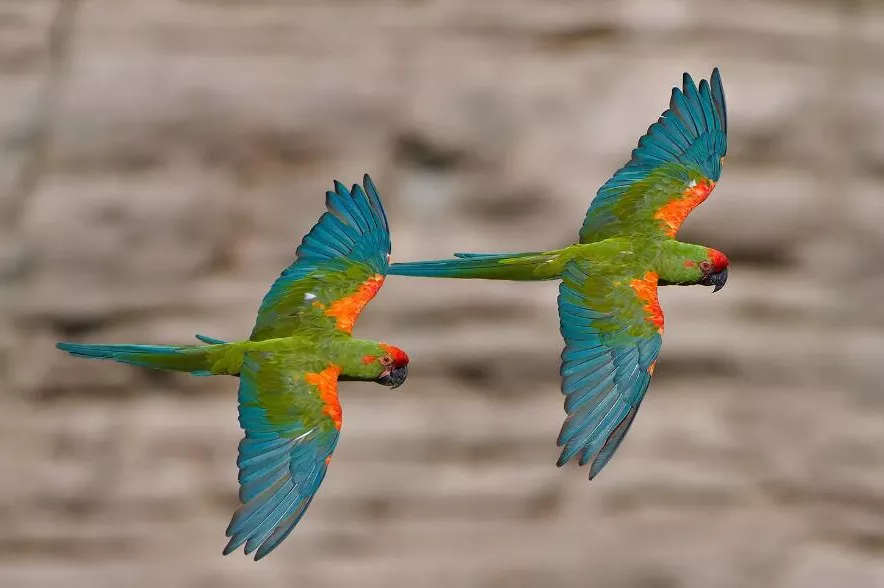Red-fronted macaws are one of the most colorful and intelligent birds in the world. They are also known as the Red-crowned Parrot, and they have an interesting history. These birds are native to Central America and Mexico, but due to deforestation and habitat destruction, their numbers have dwindled in the wild.
One of the biggest questions that people ask about red-fronted macaws is how long they live. The lifespan of a red-fronted macaw can vary depending on several factors such as their diet, environment, and care. In this article, we will delve into the lifespan of these beautiful creatures, what impacts their longevity, and how we can best care for them.
Introduction to Red-fronted Macaw
The red-fronted macaw’s scientific name is Ara rubrogenys, and it belongs to the Psittacidae family. It is a small-sized parrot which measures 40-46 cm in length and weighs around 350-400 g. The bird has green plumage with a bright red patch on its forehead, hence the name red-fronted macaw. Additionally, it has a white ring around its eyes, and some of its feathers have blue tips.
These birds are social creatures and thrive in flocks. In the wild, they are often found in areas with plenty of trees and vegetation. Unfortunately, due to habitat loss, these birds are now primarily found in isolated areas of Costa Rica, Honduras, and Nicaragua.
Lifespan of Red-fronted Macaw
-
Average Lifespan:
The Red-Fronted Macaw has an average lifespan that can vary depending on various factors, including genetics, diet, habitat, and captive versus wild conditions. In the wild, these macaws typically live for about 20 to 30 years, although some individuals have been known to live longer. In captivity, with proper care and attention, they can exceed these average lifespan estimates.
-
Longevity in Captivity:
Under human care, Red-Fronted Macaws can live significantly longer than their wild counterparts. With suitable living conditions, a balanced diet, regular veterinary care, and social interaction, these macaws have been known to live well into their 40s and even 50s. There have been reports of individuals reaching 60 years of age in captivity, although such cases are relatively rare.
Factors Affecting Lifespan of Red-fronted Macaw
Several factors can impact the lifespan of red-fronted macaws. These include:
-
Diet
A proper diet is essential for the health and longevity of red-fronted macaws. In the wild, these birds primarily feed on fruits, seeds, nuts, and vegetation. In captivity, they require a balanced diet consisting of a mix of fruits, vegetables, grains, and pellets.
It is important to note that overfeeding can lead to obesity, which can lead to various health issues. On the other hand, underfeeding can cause malnutrition and stunted growth. Therefore, it is crucial to provide adequate nutrition to prolong the lifespan of your pet red-fronted macaw.
-
Environment
The environment plays a crucial role in the lifespan of red-fronted macaws. In the wild, these birds thrive in areas with plenty of trees and vegetation. In captivity, they require a spacious cage with plenty of toys and perches to keep them stimulated and engaged.
Additionally, the temperature and humidity levels should be kept within the appropriate range to prevent respiratory infections. Proper lighting is also essential for these birds as it helps regulate their sleep cycle and maintains their feather quality.
-
Healthcare
Regular vet check-ups are essential for the health and longevity of red-fronted macaws. These birds are susceptible to several diseases like psittacosis, bacterial infections, and viral infections. Early detection and treatment of these illnesses can increase the chances of survival and prevent the spread of disease in a flock.
-
Grooming and Hygiene
Regular grooming and hygiene practices are necessary for maintaining the health and well-being of red-fronted macaws. These birds require regular baths to keep their feathers clean and healthy. Additionally, their beaks and nails need trimming to prevent overgrowth, which can cause discomfort and difficulty in eating.
Conclusion
In conclusion, the lifespan of red-fronted macaws can vary depending on several factors like diet, environment, healthcare, grooming, and hygiene practices. With proper care and nutrition, these birds can live up to 30 years or more in captivity. In the wild, their lifespan is typically shorter due to various factors such as predation, disease, and habitat loss. Therefore, it is essential to provide a suitable environment and proper care to ensure the health and longevity of your pet red-fronted macaw.


 Facebook
Facebook  Instagram
Instagram  Youtube
Youtube 